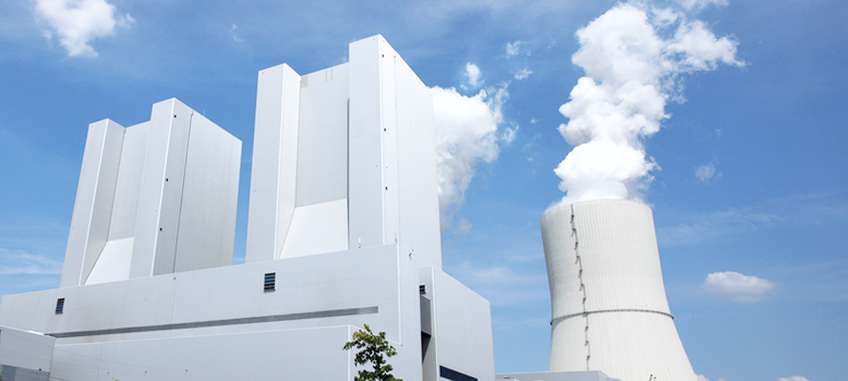Situation
Nuclear power plant Unterweser in Germany with mechanical seals, supply systems for pumps, compression packings and static seals by EagleBurgmann
Successful on-site service of the product area packings & static seals

Nuclear power plant Unterweser in Germany with mechanical seals, supply systems for pumps, compression packings and static seals by EagleBurgmann
Planned inspection of all gaskets and stem sealing kits; unforeseen increase of the workload by a tenfold
Fully equipped service container on-site with two sealing experts, who conducted an extensive on-site service
The Unterweser nuclear power plant (KKU) is operated in Stadland in the Wesermarsch district of Lower Saxony by E.ON Kernkraft GmbH. It supplies some 3.5 million homes with electricity. KKU came on line in 1978, and was the largest nuclear power plant in the world at the time. The net output is 1,300 megawatts; around 10 billion kWh are fed into the supply networks every year.
Right from the start, EagleBurgmann has supplied seals for the various parts of the plant (including mechanical seals and supply systems for pumps in the primary and secondary circuits, along with compression packings and static seals). In addition, the Packings & Static Seals (PSS) product area has been able to demonstrate the performance of its on-site sealing services for nuclear power plants to the total satisfaction of the operator.

For a planned inspection, a service container manned with two sealing experts and fully equipped with machinery, tools and sealing materials was set up on site. This allowed instant access to over 70 different gaskets and compression packings. For unforeseen cases, immediate support could be called from Burgmann Wolfratshausen and the nearby service center.
The assignment was to supply and fit all the gaskets and stem sealing kits for the components removed for inspection. This service focused on stem and housing seals for valves in all areas of the power plant. A stock of sealing materials was defined and set up in the mobile container on-site before the inspection started. The service also included the preparation of complete documentation and certification for all fitted seals (nuclear quality), in addition to the production of gaskets on-site. This demanded great flexibility from the personnel (who even had to act as valve specialists), and they all needed the appropriate work permits.

The scope of the work expanded noticeably in the course of the inspection period. For example, the number of seals that the customer originally thought would be necessary increased almost tenfold. The work included:
As the seals were kept in stock or procured by EagleBurgmann, there was no need to make use of the operator’s own seal stock. This alone meant considerable savings in terms of administrative effort. Other positive points:
According to Jörg Möller, head of mechanical engineering at the Unterweser nuclear power plant: “It was very important that the EagleBurgmann personnel were well-versed in the special documentation and certification requirements demanded by the nuclear industry. Considerable flexibility was also needed. The fact that over 600 “unscheduled” gaskets ultimately had to be produced on site was a massive challenge that they met brilliantly. Thank you so much for your super commitment.”

Between June 2017 and March 2019 the Hengli Group constructed an integrated refining and chemical complex in the Chinese harbor town Dalian where 20 million tons of crude oil are processed every year. EagleBurgmann advised the company Hengli concerning the selection of mechanical seals and supply systems for the whole plant and supplied more than 95 % of the components in use.

In Great Britain, a shortage in natural gas supply has severe consequences: Since the country switched from coal-fired to gas-fired power stations, a gas supply shortage makes households and industrial consumers not only vulnerable to failing heating and gas stoves, but also to power outages. Companies along the value and transportation chain of natural gas are therefore especially dependent on reliable equipment.

Things get hot in rotary kilns, very hot in fact. In the production of cement, for example, the thermometer measures more than 1,000 degrees Celsius. Sealing systems from EagleBurgmann, a company of the Freudenberg Group and EKK, make sustainable contributions to environmental protection, energy efficiency and process reliability under these "fiery" high-temperature conditions.

Our modern civilization is quite literally built upon cement. Today, building materials made from cement are used in buildings, roads, bridges, dams etc. Cement production is a heat-intensive process and causes thermal expansion in duct systems. To compensate this, Indian cement producer Ramco Cement needed fabric expansion joints with a diameter of several meters for two of their plants. On the basis of a close collaboration, EagleBurgmann was able to design components that increase the efficiency of the plant in the long run.

Frequent starts and stops are a severe test for gas-lubricated compressor seals. Installed in an Argentinean combined cycle power plant is an EagleBurgmann supply system that provides a continuous gas flow rate for the seals and adapts it to changing conditions. Since then, the operational reliability of the compressors has increased significantly.

Seals are a risk factor in the production of liquid crystals. If there is even the slightest contamination of the liquid crystals, this will later affect the image quality of the display. Read on to see which sealing solution Merck KGaA uses in paddle dryers for the production of liquid crystals.